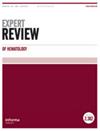Challenges and emerging therapeutic strategies for TP53-mutated acute myeloid leukemia: still disappointing findings?
IF 2.3
4区 医学
Q2 HEMATOLOGY
Expert Review of Hematology
Pub Date : 2025-01-01
Epub Date: 2024-12-04
DOI:10.1080/17474086.2024.2438241
引用次数: 0
tp53突变急性髓性白血病的挑战和新兴治疗策略:仍然令人失望的发现?
本文章由计算机程序翻译,如有差异,请以英文原文为准。
求助全文
约1分钟内获得全文
求助全文
来源期刊

Expert Review of Hematology
HEMATOLOGY-
CiteScore
4.70
自引率
3.60%
发文量
98
审稿时长
6-12 weeks
期刊介绍:
Advanced molecular research techniques have transformed hematology in recent years. With improved understanding of hematologic diseases, we now have the opportunity to research and evaluate new biological therapies, new drugs and drug combinations, new treatment schedules and novel approaches including stem cell transplantation. We can also expect proteomics, molecular genetics and biomarker research to facilitate new diagnostic approaches and the identification of appropriate therapies. Further advances in our knowledge regarding the formation and function of blood cells and blood-forming tissues should ensue, and it will be a major challenge for hematologists to adopt these new paradigms and develop integrated strategies to define the best possible patient care. Expert Review of Hematology (1747-4086) puts these advances in context and explores how they will translate directly into clinical practice.
 求助内容:
求助内容: 应助结果提醒方式:
应助结果提醒方式:


